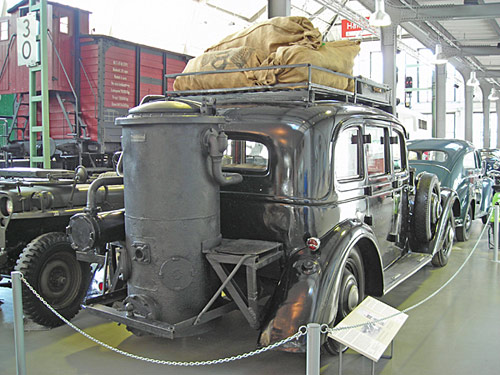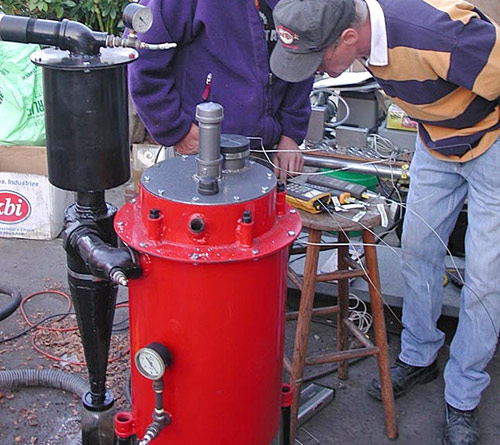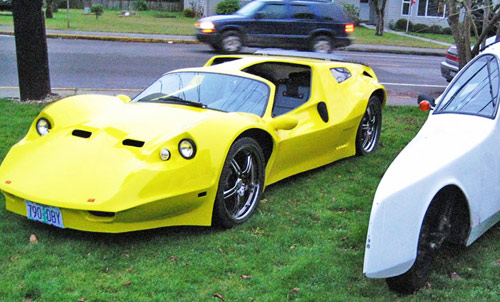Something more optimistic… Because the new work/live space that we have is more than big enough to do car work in (it has a garage door into its main space), I’ve been thinking about doing that. I thought about different power systems –
- Electric, my original plan… Costs $10,000+ to do for dubious performance. Too expensive for too little benefit.
- Biodiesel, which many have suggested… What’s the point? I don’t really see a huge savings environmentally over an efficient diesel or gas engine.
- Traditional Gas Internal Combustion… An efficient engine will get you 40+ mpg, but of course it still uses gas pumped from the guts of the earth and all the troublesome politics and infrastructure that comes with that.
The solution that I really like is gasification, which I know I’ve posted about in the past. Basically what this process does is convert coal or biomass (wood, garbage) or other carbon-rich materials into a gas mix of carbon monoxide and hydrogen (ie. wood gas). The nice thing about this gas is that it can be ignited in a normal gas internal combustion engine with very little modification. According to Wikipedia, 1 kg of wood produces the equivalent of .365 litres of petrol, so a car that gets 40 mpg (for example, a VW kit car) would get about 4 miles per kilogram of wood — or about 7,000 miles per cord (4′x4′x8′) of wood. With wood costing $175 a cord, that’s quite bearable — to say nothing of how much free waste wood and biomass is out there. If you assume gas costs $2/gallon, then the gasification system actually costs you 50% less. Oh, and emissions are also lower.
So on that note, I’m really thinking about picking up a small gasification system like the ones offered by ALL Power Labs, because it seems to me like the most sensible “alternative power” vehicle is a hybrid gasoline/gasification driveline with a home gasification system (rather than mounting it in the vehicle itself)

German Adler Diplomat 3 with Gas Generator

ALL Power Labs Gasification Kit

Wood Powered Sports Car?
You can purchase ALL Power Labs’s for $350 to $2395 depending on how complete you’d like it. Gasification is being rapidly re-discovered — it was last popular in the West during WWII when gasoline became hard to get, especially in Germany — and I suspect many will discover that it makes a lot more sense than many of the options on the table for powering automobiles (and many other things — this is also how low-emissions coal power works).



20 Comments
Have you considered a propane car? Pretty much all of the benefits of gasification, but the output is carbon monoxide and water. Very bearable for the environment, and quite cheap.
Also, gas tanks are much safer than gasoline tanks.
my mother used to ride blaugas buses back in germany in the 30-40s. they ran on coal gas.
or 2k version
https://www.youtube.com/watch?v=PfDr-XXuvmo
Shannon, biodiesel idea is in fact not that bad. Of course in terms of emission it is not ideal, but 1. diesel engine is far more efficient than gasoline engine, which means that less energy is lost for heat, and 2. vegetable oils store energy that has reached the Earth just lately, not some eons ago, like in case of petrol.
Moreover, plants used to obtain biodiesel are not trees, and their life cycle is short. It might be just me, but I would prefer not to cut any thees to move my car.
Cheers…
If you went with the wood. Contact a tree trimmer, you can almost always get wood for free from them, as long as you are willing to haul it away from job sites.
Anselm — I think it would be a surprisingly simple matter to make the car able to run on propane, woodgas, methane/natural gas, and traditional gasoline… (See also this article on converting a gas car to propane)
hammerhead — I definitely hear what you’re saying and agree we chop down too many trees, but of course woodgas can be produced with the same plants that produce biodiesel as well, so it’s not like I’d have to be chopping down beautiful oak trees. I think that rice husks for example are cited in the wiki article as one of the more appropriate sources of energy.
Shannon- unfortunately, that link is from a news story that’s decades old (70′s, I think?)
I don’t know how it is where you are, but where I am (California) you’re required to have a DOT-approved gas tank, it may not share an airspace with the people in the vehicle (like not in the trunk, unless the trunk’s been completely sealed off and vented), it may not have hoses exposed to the underside of the vehicle, and it must be installed by a “qualified” mechanic. So a lot’s changed.
Still, from my research, it looks like carburated engines are fairly easy to convert for an investment of $1,500-3,000 (as of last summer in California), and possibly less if you can define what “qualified mechanic” means, and perhaps do it yourself.
I can give you more info if you’d like, but it’d all be California-specific.
Haha, oh yeah, 1972! I didn’t notice that. No wonder they were talking about converting a VW bus. That said, other than the red tape, the conversion is still the same I assume.
Wiki page on “Bi-fuel vehicles” … there are lots of interesting pages on bi-fuel and tri-fuel conversion projects as well that look promising.
Shannon-
Yeah, in essence, it’s the same, but don’t underestimate the red tape! I don’t know how it is in Canada, but I know that in California it went from being a home-brew project someone with even a small amount of know-how could do in a weekend with about $500 in parts and a good manual (adjusted for inflation), to being something that costs several thousand, has to be done in a shop, and there are only about three shops in the state that do it.
The other big problem is that propane (and most gasses) run great in carburated engines, and are easily adapted into bifuel systems. If you’re working with an injected engine, however, you have to to either convert it to carburated (big deal, costly), or invest in propane/gas injectors in addition to doing the bifuel conversion.
Good luck! It’s certainly worth doing! I’m currently trying to sell my ’06 VW Rabbit so I can get a beat-up old Toyota pickup and do just this. Someday, I’d love to drive a classic American muscle car that runs on propane and has clean-air stickers.
I’ll probably build around an air cooled carbureted 1600cc beetle engine because it’s so simple and I’m familiar with them.
Shannon-
In that case, you’re all set to go! Just make sure you’re in compliance with local laws, as well as any laws in areas you’re planning to travel/sell to, and have fun!
Oh, one more thing! I don’t know about Canada, but I know that in the US barbecue propane (sold for home consumption) costs about the same per gallon as gasoline. However, vehicle propane (same stuff, just sold under a different name) sells for half as much. It’s a tax thing. U-Haul sells vehicle propane here in the Cali, and it might be much the same up there.
I’m sorry I only comment when I disagree with you… you post a lot of good stuff.
The environmental advantage of biodiesel is the same advantage as gassifying wood… the carbon in the fuel is taken out of the air by a plant and then returned to the air during combustion. The negative environmental impact of both of these schemes is that land (which could be otherwise used as habitat or to grow food) is used to produce the fuel. Biodiesel can be produced from plants which take a year to produce a high yield. Wood takes decades to grow.
Also, having a tank of carbon monoxide (a deadly gas) seems a scary prospect to me.
Have you thought about the Brazilian ethanol model, powering cars on alcohol fermented from sugar cane?
Also, diesel is better environmentally per mile driven than petrol/gas hands down.
I wonder if your predilection for fancy cars causes a bias in your assessment of environmental impact?
Good luck with any projects you undertake.
Elk – One major difference is that biodiesel requires a serious infrastructure, whereas woodgas is much more versatile in what you can make it out of (including waste materials that have negligible impact)… As has been mentioned before you don’t have to use wood. I would also guess that you get a higher percentage of the energy out using woodgas than you do with biodiesel.
one does not necessarily need (refined, transestered) biodiesel to run a diesel car more eco-friendly. Pure, untreated vegetable oil does the trick just as well, at least for some engine designs and those who live in warmer climates. I just substituted diesel with canola oil in the 1993 Mercedes I once owned without any conversion work whateoever. Ran perfectly for 30,000 miles. Fuel costs halved.
Diesel engines are more efficient than gasoline engines in general if I’m not mistaken. Also biodiesel can be created purely from waste materials. I’m presuming it is simply more environmentally friendly to turn waste into fuel than to dig into the earth for black liquid to turn into fuel.
Now growing crop for fuel is another matter. I think extensive energy economics analysis would have to be done for that one, but I’m pretty sure that to run all cars on grown biodiesel one would have to deny food to much of the earths population that already has access to it.
Biodiesel cannot be created in meaningful quantities from waste materials. There’s not enough left over fryer oil (etc) for even a small percentage of cars!
Hi
Biodiesel is great except for the part about fuel vs food. its only good when its from waste cooking oil and that doesn’t scale well. gasification offers some good advantages over biodiesel because of the versitility. you could use the stalks and seed husks of the biodiesel plant, for example, that biodiesel could not. you could use coal.
generaly the fewer intermediate stages the more efficient the processes is. this is the reason why ethanol vehicles will never scale. its more efficient to burn the sugar for energy than feed it to bugs.
One Trackback/Pingback
[...] coolest thing though is the fuel. I’ve talked about in the past Germany was in a major fuel crisis, and there were a half million cars converted to run [...]
Post a Comment